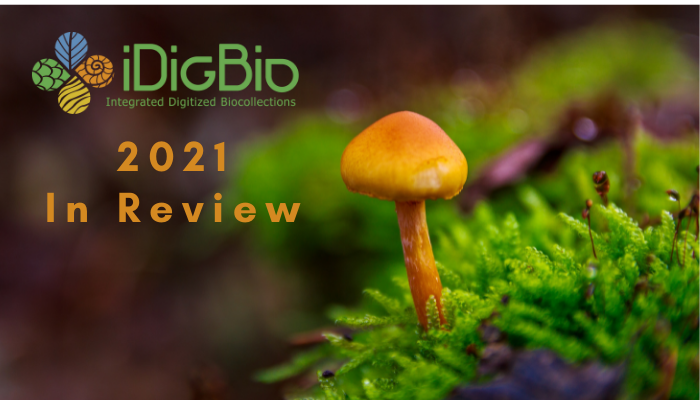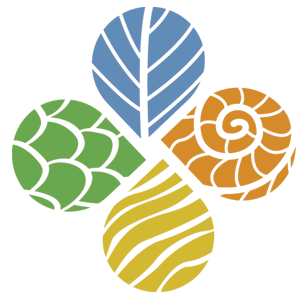
Happy 2022 to all collections’ community colleagues. iDigBio is excited about the biodiversity community’s collective successes in 2021 and is looking forward to an adventurous upcoming year with many new activities on its workplan.
Among our community’s most welcomed achievements from 2021 were the announcements of continued NSF support of collections digitization and data mobilization through an additional 5-year extension for iDigBio as well as a continuing commitment to direct funding of collections. Two exciting TCNs and four new PENs were announced in early fall, and funding for biological collections, cyberinfrastructure, and field stations will continue through the Infrastructure Capacity for Biological Research (Capacity) program.
iDigBio was especially pleased to welcome the Symbiota Support Hub to the iDigBio family of services. Symbiota software has been integral to the collections community, iDigBio, and the ADBC effort since its inception and we anticipate it will become even more important in the coming years. Symbiota has been a major conduit of data into the iDigBio portal through a close association with several iDigBio domains and has been “go to” software for a large number of TCNs. Its support of smaller collections has been instrumental as an avenue for these collections to make their data findable and accessible online.
The successes of the Advancing Digitization of Biodiversity Collections program were celebrated at September’s Biodiversity Digitization: Celebrating a decade of progress event, co-sponsored by NSF, the National Museum of Natural History—Smithsonian (NMNH), iDigBio, and GBIF. Registrations exceeded 1,000 participants from all around the world and attracted an excellent array of presentations and posters addressing a variety of themes. In addition to other valuable program contributions, NMNH offered several excellent and well-attended virtual collections tours encompassing botany, molluscs, cultural objects, and entomology.
iDigBio’s Digitization, Workforce Development, and Citizen Science domain sponsored the second installment in its new Digitization Academy, this time focused on public participation in biodiversity specimen digitization (the inaugural course was launched last summer). The Academy is poised to deliver a suite of in-person and virtual digitization-related workshops, webinars, and training sessions throughout iDigBio’s next five years. The domain also conducted two more WeDigBio events in April and October 2021 and will continue these events in 2022 and the coming years.
A growing number of office hour and interest group meetings are also continuing, including the Education, Outreach, Diversity, and Inclusion (EODI) domain’s Collections Education Coffee Break Series, the workforce development domain’s Paleo Digitization Happy Hour, the cyberinfrastructure domain’s API Office Hours, and the new Symbiota Support Group. The citizen science domain also hosted in 2021 the successful Citizen Science Hour for Biodiversity Collections webinar series. During Fall 2021 EODI, with NSF involvement, organized a listening session for minority-serving institutions (MSI) with plans to expand the focus and to turn this into a continuing activity.
EODI continues its collaboration with the Society for the Advancement of Chicanos/Hispanics and Native Americans in Science (SACNAS), the leading organization fostering success in science for Hispanics and Native Americans. For SACNAS’s 2021 National Diversity in STEM (NDiSTEM) Digital Conference, iDigBio sponsored a successful workshop and virtual bioblitz that attracted more than 100 participants. Final preparations are now underway for the 2022 hybrid iDigTRIO conference, to be held February 21-26. Co-sponsored by iDigBio and TRIO Student Support Services in the Office of Academic Support at the University of Florida, this annual event has become a well-attended and popular venue for high school, undergraduate, and graduate students to explore career opportunities in biology and paleontology. Other EODI activities include continuation of paid summer museum internships for undergraduate students to foster interest in museum and biodiversity related careers.
Facilitating biodiversity research through digitization and accessible data continues to be a major focus of iDigBio. This year’s annual Digital Data in Biodiversity Research Conference is scheduled for May 23-25, with registration opening February 1, and abstract submissions due March 16. This will be the sixth edition of the conference, which has become a popular gathering spot for biodiversity scientists to share research results, protocols, and novel approaches. iDigBio will also continue biodiversity data research events at major conferences and independent workshops focused largely on data availability and analysis.
In the face of rapidly expanding international collaborations, global engagement is fast becoming an important iDigBio activity and interest area. For example, the cyberinfrastructure and administration domains are working closely with GBIF on a number of initiatives. In 2021, the two teams completed the integration of the GBIF and iDigBio collections registries, co-locating data storage at GBIF to ensure edits made through GBIF or iDigBio remain synced. In early 2022, the iDigBio cyberinfrastructure team will begin a series of virtual meetings followed by one or more in-person meetings with GBIF’s team to explore fruitful collaborations. Similar international collaborations are being pursued with Europe’s Distributed System of Scientific Collections (DiSSCo), Atlas of Living Australia (ALA), Centro de Referência em Informação Ambiental (CRIA) in Brazil, and the NSF-funded Biodiversity Collections Network (BCoN).
iDigBio is delighted with the collections community’s prospects for 2022 and is looking forward to maintaining a strong relationship with our museum and collections colleagues.




